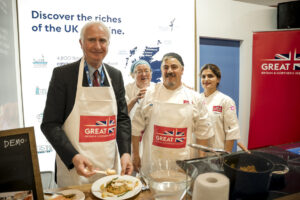UK SMEs Urgently Need Decarbonisation Support

London Business Improvement District, Better Bankside, is delighted to secure a further £252,000 in funding from the UK Shared Prosperity Fund (UKSPF), to continue its Southwark Climate Collective (SCC) programme – providing targeted sustainability and de-carbonisation support to Southwark SMEs. The funding acknowledges the success of the project so far, in responding to the urgent need for a scalable model of support for SMEs to become more sustainable.
According to the UN-backed SME Climate Hub, SMEs need urgent support to decarbonise their business operations, hampered by a lack of skills and knowledge (63%), funding (48%) and time (40%). SMEs are vital for achieving London’s net zero target, accounting for over 90 percent of the business population and approximately 40 percent of the UK’s non-domestic emissions. With economic headwinds putting additional financial pressure on SMEs, more support than ever is needed to overcome the barriers to SME business decarbonisation.
Launched in 2023, Better Bankside’s Southwark Climate Collective (SCC) programme has equipped more than 140 SMEs with the tools, skills and technical support to cut their emissions. The programme, led by Better Bankside, and supported by partner organisations (including Southwark Council,) focuses on overcoming significant barriers faced by SME’s in decarbonisation, such as limited resources, knowledge and capital investment – recognising the need for a tailored solution, and collaborating with a network of partners to deliver against four key SME decarbonisation streams; waste, freight, energy and supply chains. The £252,000 in new funding from the UK Shared Prosperity Fund (UKSPF), will allow the SCC programme to continue to build capacity (through bespoke training) within SME’s, as well as providing targeted technical support to assist businesses to implement workable decarbonisation plans. Better Bankside’s overall aim for the project is to find a proven, scalable model of support for SMEs that can be rolled out across London, backing the objectives of the Mayor of London’s growth and netzero strategy.
Nicole Gordon, CEO of Better Bankside, commented: “The Southwark Climate Collective has demonstrated that SMEs are eager to act on climate change when given the right support – and with SMEs making up 90 percent of London’s business population, investment in this area is critical to achieving the capital’s net zero targets. Key to SCC’s success is its design as a scalable model of business support that brings together local expertise, public and private partners, and community networks to drive climate action from the ground up. It shows the power of Better Bankside and its local network, to deliver replicable solutions to issues that can serve the rest of London and beyond. Our ambition to energise businesses into climate action is more important than ever as we close in on the capital’s climate deadline.”
SCC Programme – Progress and insights so far
With initial UKSPF funding of £653,000, the SCC programme has supported 140 Southwark
SMEs with bespoke audits, training and action plans across four critical decarbonisation streams: energy, freight, waste and supply chains. Importantly, each SCC stream targeted practical operational areas where SMEs could realistically implement meaningful changes.
Key insights so far include:
· For SMEs – business and economic drivers are just as important as climate objectives – essential both are achieved.
· SMEs reported that technical Audits and Recommendation Reports were the most valuable aspects of the programme, but can’t be delivered without in-house skills and knowledge – training is key.
· SMEs face significant barriers when it came to their time, resources and capital investment.
· More work is needed to better engage and understand the barriers faced by Black, Asian and minority-owned/ led businesses.
SCC Programme – SME case studies
(More detail on each of these case studies available on request)
Watch SMEs talk about their experience of the SCC programme here: Southwark Climate Collective Case Studies – YouTube
· Wanstor, a logistics-heavy tech firm, reduced its freight emissions by 80% and cut collections and deliveries by 46% through the SCC programme. It also advocated for greener fleets with its partners.
· Burgess Sports, a community sports charity, experienced a 66% increase in avoided emissions in terms of kgCO₂2 per tonne saved through recycling, and improved correctly disposed recycling by 27%.
· Southwark Cathedral, a Grade I listed site, used its SCC audit to rethink its heating strategies – uncovering the need to shorten heating cycles and target heat only where needed (rather than heat the entire internal space.)
Councillor John Batteson, Cabinet Member for Climate Emergency, Jobs and Business at Southwark Council, said: “Southwark is home to an incredibly strong business community with over 18,000 businesses and 300,000 people contributing to a thriving local economy. 95% of businesses are small or micro with fewer than 10 employees so we know they have a vital role in creating a healthier and more sustainable borough. We know SMEs across Southwark want to play their part in tackling the climate emergency but we also appreciate there are hurdles which can prevent them from doing so….
“The programme has shown there is lots of work that needs to be done to engage SME’s but it has also provided an excellent framework for the type of support that will allow businesses to properly embed climate initiatives into their day-to-day operations. This is just one part of the story which I am sure will continue to develop as we look to create an even fairer, greener and more resilient economy in Southwark.”




